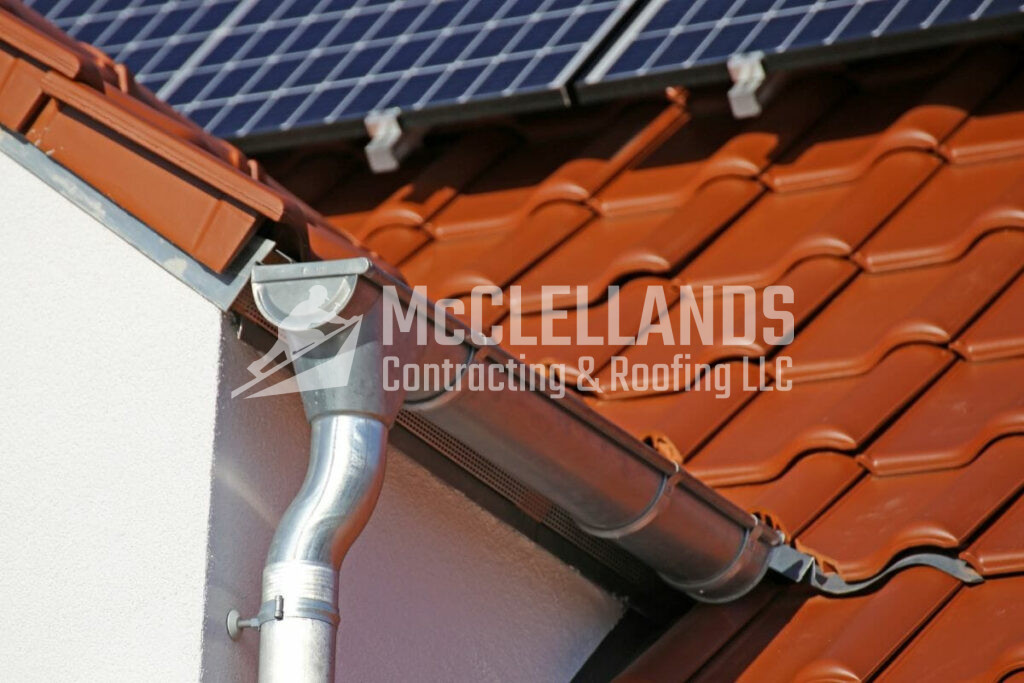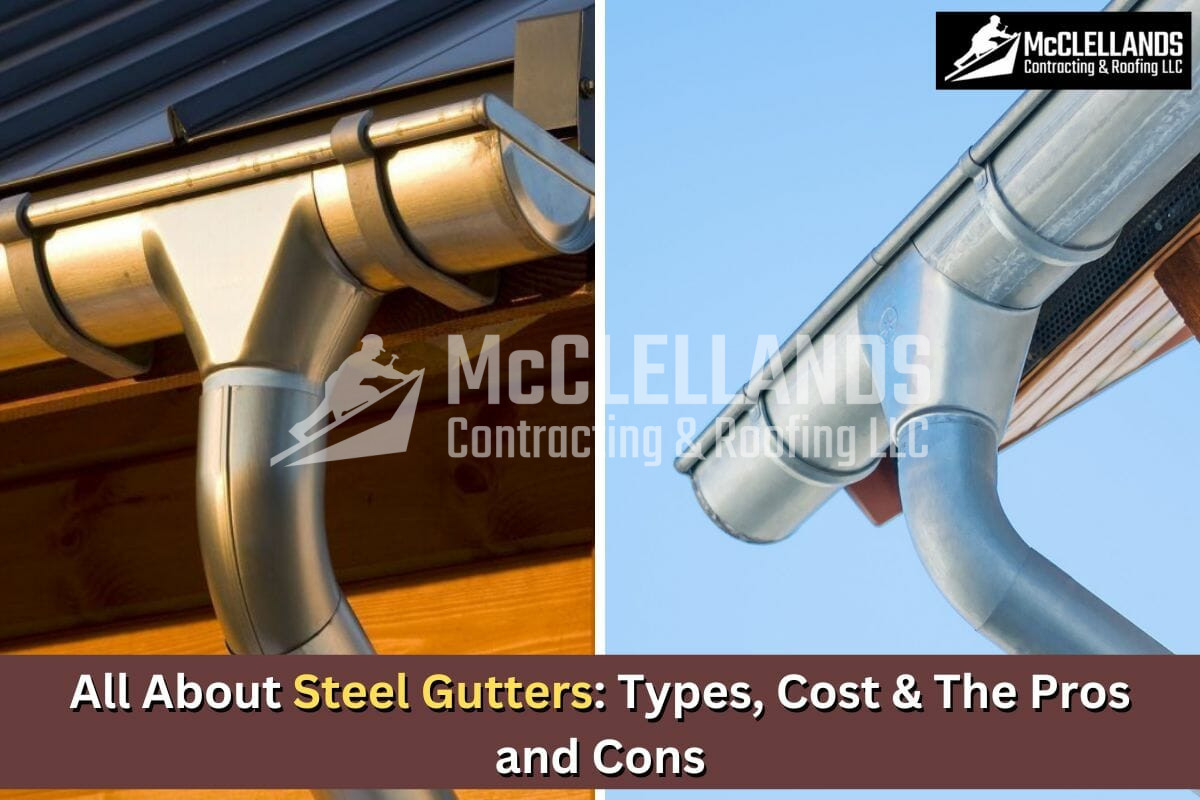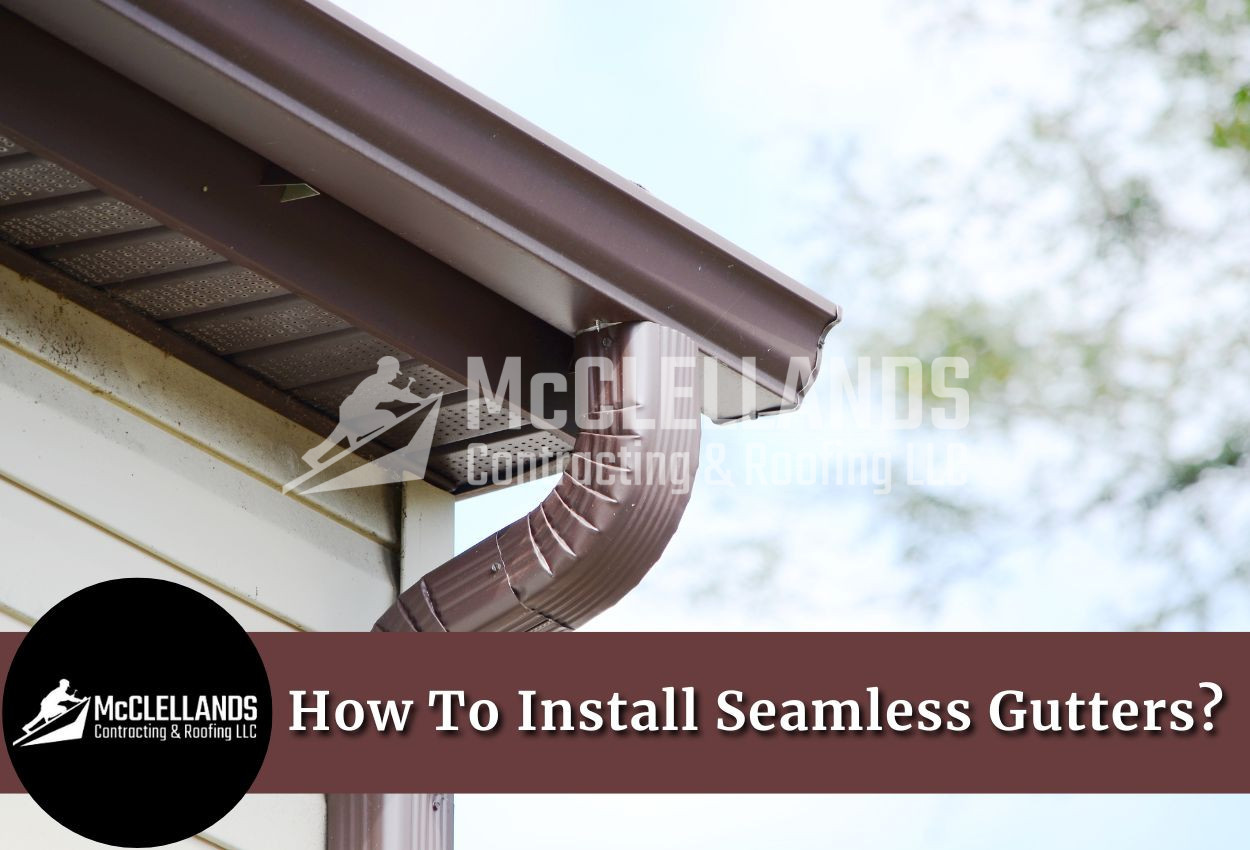To keep your home dry and free from rainwater damage, installing sturdy roof gutters is of utmost importance. If you are thinking of installing new steel rain gutters on your roof, this guide will walk you through everything you need to know. Steel gutters are offered in many styles, and as an expert in the field, I’ll help you figure out which one is suitable for you.
Let's explore steel gutters and find out if this material is best for your home.
Introducing Steel Gutters
Rain gutters play a crucial role in safeguarding your home's foundation and exterior from water damage caused by rainwater runoff. They efficiently collect rainwater from the roof and redirect it away from your property, preventing soil erosion, foundation cracks, and basement flooding. To ensure the protection of your home, you need a robust roof drainage system that’s durable and can last for decades.
Since steel is prone to rust, steel roof gutters are not used without a waterproof coating. There are enhanced versions of these gutters where steel is used as the base metal which is then coated with rust-free metals like zinc and aluminum. These types of gutters and downspouts have always been popular due to their affordability, weatherproofing capabilities, and customization flexibility.
Let’s learn about these options in detail.
Exploring Different Steel Coatings
With gutters made of steel, there are two primary types to choose from: galvanized steel and stainless steel.
Galvanized Steel Gutters
Galvanized steel rain gutters are coated with a layer of zinc, making them highly resistant to rust and corrosion. They are an affordable option for homeowners seeking reliable gutters without breaking the bank.
Stainless Steel Gutters
Stainless steel roof gutters are known for their unparalleled durability and corrosion resistance. While they come with a higher price tag, their longevity, and low maintenance make them a cost-effective choice in the long run.
As with any drainage system, there are pros and cons of steel gutters, which are listed below.
Benefits of Rain Gutters Made of Steel

Steel offers a plethora of benefits that make it stand out as a highly preferred gutter material.
1. Exceptional Strength and Durability
Steel is renowned for its solid composition that can withstand heavy rain, snow, and strong winds without warping or cracking easily. Plus, galvanized and stainless steel gutters can last nearly 20 years with moderate maintenance efforts.
2. Rust and Corrosion Resistance
A galvanized steel gutter system is ideal for areas with high humidity and coastal areas where moisture exposure is prevalent. Stainless steel gutters offer even greater longevity, making them an excellent investment for homeowners seeking a gutter system that can remain rust-free for a long time.
3. Suitable for Storm-Prone Areas
If you live in a region where hail, wind, and thunderstorms are frequent, steel gutters shine with their superior capacity to handle substantial water volumes and high impacts. This eliminates the need for early damage and replacement of these gutters.
4. Eco-Friendly Option
Steel roof gutters are an eco-friendly choice as they are made from recyclable materials. When the time comes for replacement, the old steel gutters can be recycled, reducing landfill waste and promoting sustainability.
5. Customization and Aesthetics
Steel offers the versatility of customization, allowing homeowners to choose from various shapes and sizes that best complement their home's architectural style. Additionally, they can be painted in different colors and coats to match the exterior, enhancing the overall curb appeal of the property.
Cons of Steel Gutters
As with any material, steel also has its drawbacks that you should consider before making a final decision.
It May Require Recoating
While galvanized steel gutters are treated with a layer of zinc to resist rust, this protective coating may wear off over time. Once the underlying steel is exposed to moisture, rust can gradually develop, compromising the gutter's structural integrity and reducing its lifespan.
Steel Rain Gutters are Heavy
Steel is a heavy gutter material compared to other alternatives, like aluminum and vinyl. The additional weight can pose challenges during installation, requiring proper support and reinforcement. Homeowners may need to invest in sturdy hangers and brackets to bear the weight of steel gutters.
Conducts Heat and Transfers Cold
Steel is a good conductor of heat, which means that during hot summer days, the gutters can become quite warm. Similarly, during colder seasons, steel roof gutters can quickly transfer the chill to the collected rainwater, leading to potential ice formation in the gutters and downspouts. But fortunately, you can mitigate these issues by installing heat cables along the gutters in the winter.
Requires Moderate Maintenance
Despite being sturdy, steel rain gutters still need periodic care to ensure they function optimally and remain rust-free. Homeowners should install gutter guards, inspect and clean the gutters after a windy day, and address issues promptly.
Wondering if you should install gutters made of aluminum or copper instead? Let’s compare these options further.
Comparing Steel with Other Gutter Materials
When selecting the right gutter material for your home, it's essential to understand how steel compares with other common options.
Steel vs. Aluminum Gutters
Both steel and aluminum gutters are durable and corrosion-resistant, but they differ in terms of weight and cost. Steel gutters are heavier and may require additional support during installation, whereas aluminum gutters are lighter and easier to handle. On the other hand, steel gutters are generally more robust and better suited for areas with heavy rainfall and harsh weather conditions.
Steel vs. Vinyl Gutters
Vinyl gutters are lightweight, affordable, and easy to install, making them a popular choice for DIY homeowners. However, they may not be as sturdy as steel gutters, and extreme temperature fluctuations can cause them to crack or warp. Steel gutters, with their superior strength and durability, offer better protection against potential damage.
Steel vs. Copper Gutters
Copper gutters are known for their elegant appearance and the patina that develops over time. While copper rain gutters can be visually stunning, they come at a significantly higher cost than steel. If aesthetics are a top priority and budget is not a concern, copper roof gutters might be the way to go.
For a more cost-effective option with comparable aesthetics, you also have the option to choose faux copper gutters. These are gutters made of steel or vinyl and painted in copper color or coated with a thin layer of natural copper metal.
Know the Costs: Are Steel Gutters Worth It?
Steel is an affordable metal, and with a fine coating, it will fall within a moderate price range. On average, installing galvanized steel gutters costs around $8 to $14 per linear foot. However, stainless steel gutters can be expensive, with an average price range of $11 and $33 per linear foot. As for downspouts, the cost to install one steel downspout is between $9 and $12 per foot.
If you want to replace your old or damaged rain gutters with a better gutter system in Pittsburgh, our team is here to help you!
Get a Free Estimate on Gutter Replacement in Pittsburgh, PA
At McClellands Contracting and Roofing, we care deeply about your home and its well-being. Our mission is to provide you with top-quality solutions that safeguard your property and bring you peace of mind. If the benefits of steel gutters have inspired you, or you want to explore more options, call us at (412) 353-5660. We’ll be happy to help you with a free consultation on your gutter options and provide a free estimate on your gutter replacement project in Pittsburgh, PA.




